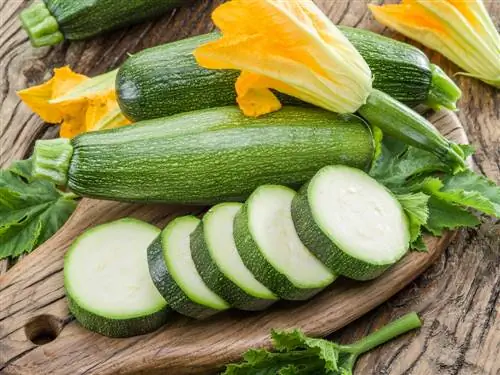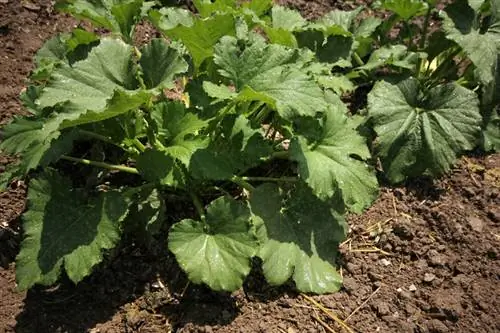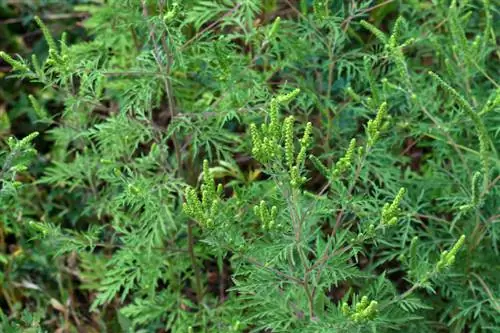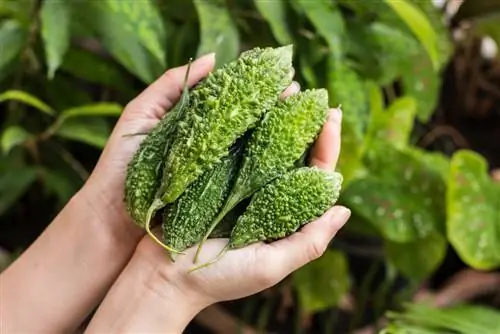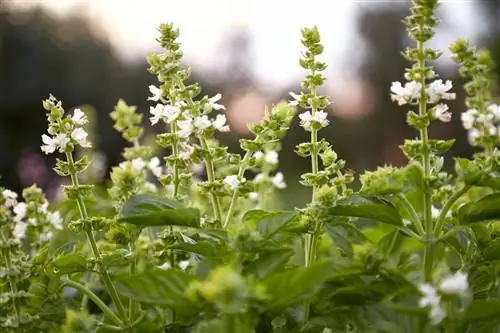- Author admin [email protected].
- Public 2023-12-16 16:46.
- Last modified 2025-06-01 06:02.
Bitter zucchini are poisonous - no ifs or buts. You can find out why this is the case here. How you can recognize the danger of poisoning in good time is no longer hidden from you. This guide explains in a practical and understandable way why zucchini from your own harvest are affected more often than zucchini bought from the supermarket.
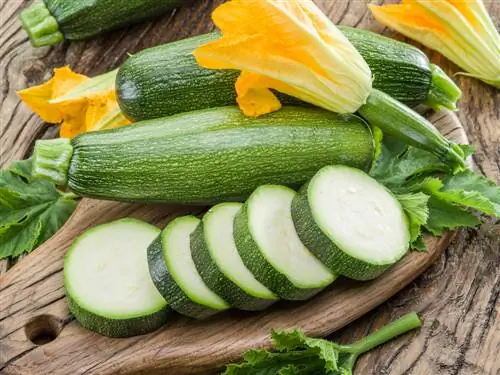
Why are some zucchini bitter and what should I do?
Bitter zucchini contain toxic cucurbitacins, which pose a risk of poisoning. This can be recognized by the bitter taste, regardless of the variety or color. Home-grown zucchini are most affected due to cross-pollination, heat stress or incorrect seeds. If the zucchini tastes bitter, it should be discarded.
- If zucchini tastes bitter, consumption poses a high risk of poisoning with fatal consequences in the worst case.
- The cause of the bitter taste is the plant's own toxic cucurbitacins, which are bred from premium supermarket varieties and are often contained in hobby garden zucchini.
- Storage that is too cool or long, heat or drought stress activates the production of bitter substances. Boiling or frying does not dissolve the toxins.
Why does zucchini become bitter?
If zucchini tastes bitter, your he alth is in danger. The cause of the dilemma is cucurbitacin, a poisonous plant bitter substance in the peel and pulp. Type and color don't play a role. Green and yellow zucchini are equally affected. Even in small quantities, the plant poison causes excruciating symptoms such as nausea, stomach cramps and diarrhea. In higher concentrations there is a risk of serious or fatal poisoning.
The good news is that the toxic bitter substances in garden varieties have long since been bred out. The bad news is that under certain circumstances an unhe althy concentration of bitter substances can still build up. There is usually a serious risk of poisoning when eating home-grown zucchini.
How to recognize bitter zucchini?

Before cooking the zucchini, you should try a piece to eliminate any bitter ones
The bitter taste of a zucchini cannot be seen from the outside. With a sample you are on the safe side. How to tell if zucchini contains toxic bitter substances:
- Wash and cut zucchini
- Place a small piece, raw and unseasoned, in your mouth
- If the zucchini has a mild, fruity-nutty note, prepare and serve as usual
- If the taste is bitter, spit out the sample and discard poisonous zucchini
If you notice an unpleasant, bitter smell before cutting, you can save yourself the taste test. Zucchini poisoned with cucurbitacin smells unappetizing and musty.
Be careful, dear parents. Please always carry out the taste test for your children yourself. In small children, the sense of taste is often not developed enough to recognize a bitter aroma.
Tip
Mild taste is not the only quality feature for he althy vegetable pumpkin. If you prefer to eat zucchini raw, there are other important criteria to consider. If the product comes from the supermarket and does not have an organic seal, pesticide residues on the peel make the fruit unhe althy. Simply peel and nothing stands in the way of carefree zucchini enjoyment.
Zucchini tastes bitter - when? - What to do? - How come? Overview
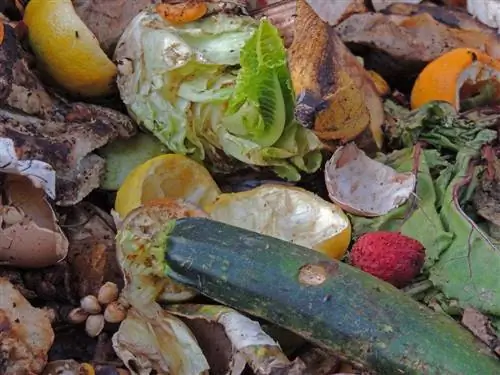
Bitter zucchini should be thrown away
Fadly, cucurbitacin is an extremely resistant plant poison that leaves you little scope for countermeasures. The following table provides an overview of common initial situations and the correct course of action with a brief explanation of the cause.
| Taste test | What to do? | Why? |
|---|---|---|
| bitter after cooking | throw away | Poison not soluble in water |
| bitter after frying | throw away | Poison is heat resistant |
| old zucchini bitter | throw away | toxic due to long storage |
| frozen zucchini bitter | throw away | Poison is frost resistant |
| slightly bitter | throw away | smallest amounts of poison are unhe althy |
| Peel tastes bitter | throw away | Poison is also in the pulp |
| Supermarket zucchini slightly bitter | throw away | overripe zucchini become poisonous |
Throwing away is the only correct course of action if zucchini tastes bitter. The toxins contained do not dissolve under any circumstances. Cooked, fried or frozen zucchini remain unhe althy if the sample tasted bitter before processing. If only the peel tastes slightly bitter, peeling will not prevent the threat of poisoning. Old zucchini that have been stored for too long subsequently build up an unhe althy concentration of bitter substances. This also applies in the very rare case that overripe zucchini purchased from the supermarket tastes bitter.
Excursus
Taste test useful for all types of pumpkin
Poisonous cucurbitacin is a natural defense strategy of all cucurbits. It's not just the popular vegetable pumpkins, zucchini, that can be contaminated with poison. The variety of species ranges from crunchy cucumbers and juicy melons to delicate pumpkins such as patisson squash or butternut squash. The rule of thumb for preparation in the kitchen is: first taste the pumpkin varieties for a bitter taste, then season and serve.
Hobby gardeners beware - cross-pollination makes zucchini bitter
Victims of bitter substance poisoning are often hobby gardeners who grow their own zucchini. The most common cause is mixed culture with ornamental pumpkins and the associated cross-pollination. Other causes include drought and heat stress, which cause the content of toxic bitter substances to skyrocket. When harvesting seeds in the zucchini bed, you can never be sure whether foreign ornamental pumpkin pollen from neighboring gardens has gotten into the genome. This is how you can grow delicious zucchini yourself for carefree enjoyment without a bitter aftertaste:
Do not place zucchini next to ornamental pumpkins
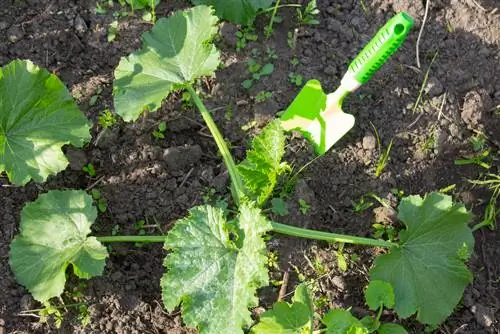
Zucchini should not be planted next to ornamental pumpkins
Ornamental pumpkins naturally contain a high concentration of toxic bitter substances. If busy bees first visit an ornamental squash flower and then fly to a zucchini flower, the dreaded cross-pollination with increased cucurbitacin levels occurs. The best prevention is to strictly avoid a mixed culture of zucchini and ornamental squash.
Stress-free zucchini care
Cucurbitacin's raison d'etre is not to spoil our culinary enjoyment of zucchini. Rather, bitter substances in cucurbits act as the plant's own protective shield against predators, pests and stress-related growth disorders. Influencing factors such as heat, cold or drought trigger the production of substances and cause the bitter, poisonous taste in zucchini. Stress-free care prevents this process. This is how it works:
- Grow zucchini in a warm, wind-protected location without summer heat (heat activates bitter substance production)
- Ideally prefer young plants behind glass and plant them out from mid-May
- Protect from cold snaps with a fleece cover or polytunnel (cold makes zucchini bitter)
- Water regularly in dry conditions (lack of water causes bitter taste)
Pluck out weeds in the zucchini bed with your hands. Chopping can cause root injury, to which the plant responds by producing cucurbitacin.
Use certified seeds
Zucchini seeds from specialist retailers are reliably free of bitter substances. In order to protect their he alth, ambitious hobby gardeners exceptionally forego sowing seeds they have obtained themselves. Purchasing certified seeds annually for home cultivation reduces the risk of bitter-tasting zucchini to a minimum.
The following video provides three important tips for hobby gardeners who grow their own zucchini:

Frequently asked questions
Why does zucchini become bitter?
The cause of the bitter taste are the plant's own defense substances, so-called cucurbitacins, which zucchini use to arm themselves against all kinds of disorders. Breeding interventions were able to deactivate these toxic bitter substances in commercial varieties. When grown at home, the bitter toxins are naturally present in many zucchini plants as a result of cross-pollination or unsuitable seeds. Furthermore, storing them in the refrigerator or freezing them in the freezer will make your zucchini bitter. At temperatures below 10° Celsius, toxic bitter substances can also form in refined cultivars.
I ate bitter zucchini. Is this dangerous?

Eating a bitter zucchini does not have to cause he alth problems
Eating zucchini with a bitter taste does not necessarily have to cause he alth problems. Your constitution and the amount of bitter substances ingested determine whether symptoms of poisoning occur. If you experience nausea, cramps or suffer from diarrhea after consumption, please consult your family doctor. Eating cucurbitacin is often dangerous if the bitter zucchini comes from a hobby garden.
How to tell if zucchini is poisonous?
A zucchini should taste mild, fruity to slightly nutty. If you notice an unpleasant smell while cutting, you should be careful. Try a small piece of raw, unseasoned zucchini. If the sample tastes slightly bitter, spit it out immediately and throw the zucchini in the trash can.
Why do old zucchini become bitter?
Long storage reactivates toxins that are dormant in zucchini. For this reason, zucchini should be harvested young and stored dark and cool at 12° to 15° degrees for a maximum of one week.
Can store-bought zucchini taste bitter?
Zucchini from the supermarket are noble varieties from which toxic bitter substances have been bred out. When purchasing, look for a flawless, shiny shell that gives only a little when pressed lightly with your finger. Under these conditions you can look forward to a mild, fruity culinary delight. Toxins may have formed again in soft, overripe, shriveled zucchini, which are responsible for the bitter taste.
What to do if the zucchini casserole tastes bitter?
Throw the zucchini casserole in the trash immediately if it tastes bitter. The bitter taste is an unmistakable indication of impending poisoning from cucurbitacin. In 2015, a pensioner lost his life because he ignored the extremely bitter taste while eating a zucchini casserole and ingested a fatal amount of toxins.
Can you get rid of the bitter taste of zucchini by cooking or frying?
No. There is no culinary trick to refine bitter zucchini. The bitter note indicates that the fruits are poisoned by cucurbitacin. This plant toxin is heat resistant and does not dissolve in water. Anyone who covers up the bitter taste with spices and eats zucchini will have to pay for it with serious symptoms of poisoning.
Tip
How devastating when laboriously grown zucchini tastes bitter. It doesn't have to come to this if you carry out an early taste test on your own pumpkin plants. When growing from seeds on the windowsill, taste one of the first cotyledons. If you notice a slightly bitter taste, the seedling in question is discarded. This does not replace the final taste test before consumption. At least you are spared a lot of wasted time on cultivation, care and harvesting.

